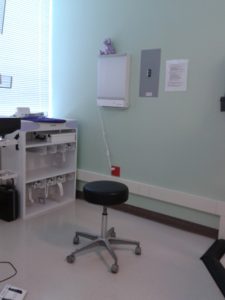 Reach out and touch someone.
Reach out and touch someone.
Guest: Karen Vorich Hickman, Founder of Professional Courtesy LLC
More and more, I hear business people say that they don’t like to touch people, shake hands or to be touched by others due to the risk of getting germs. This is a very sad commentary, as far as I am concerned. But even sadder, to me, was to hear nurses say they don’t like to touch their patients because they feel they are unclean or they don’t want to risk getting their germs.
While I appreciate not wanting to get someone’s germs that may cause an illness, I think to take the
“no touch” approach with your patients is risky and very damaging to developing a mutually respectful relationship.
Nurses and physicians are certainly taught techniques on handwashing, maintaining sterile fields, dealing with patients who are infectious by using isolation procedures and various other ways to protect themselves and avoid spreading diseases to other people. So why the resistance to touch your patients when it’s more than likely you’ll keep an eye on your hygiene practices at work, and then at home too with the use of products you can see on this page that offers Hand Sanitizer Canada based deliveries or alternative websites or stores you’re able to purchase similar hygiene products.
I think it is multifaceted with some of it brought on by how high tech medicine has become. Healthcare workers are now booting up their computers to enter data and the answers to the questions they ask their patients, often, before they even shake their hand or make eye contact with them. Physicians are now able to do every test imaginable to diagnose patients that it seems rather easy to forget about actually putting your hands on the patient. I have even had people tell me they received a complete physical without ever having taken any clothes off. This is unimaginable to me. If physicians aren’t actually looking at someone’s body, I would guess they are missing some things.
We know from studies that babies who are not touched fail to thrive and some, even die. The human touch is a big part of diagnosing and healing. Imagine the elderly patient who lives alone and has no one to hug them. Touching people and being touched is essential to life. We all seek touch from those we love. Why not make sure it is part of the equation when caring for your patients.
So, here are some tips to ensure you make some sort of physical contact with your patients:
- Upon entering a patient’s room in the hospital or the office exam room, extend your hand to meet them before you go to the computer to start asking questions.
- If handshaking is not possible, touch the patient on the shoulder, or arm. This is a comforting gesture when consoling them or delivering bad news…something they will appreciate.
- Spend a few moments talking directly to the patient. Note the color of their eyes to make sure you are making appropriate eye contact.
- Introduce yourself and let them know what you do and who you are; nurse, tech, P.A., etc.
- While entering data in your computer, look at the patient while asking the question and then look at the keyboard when entering their answers. Reassure the patient that you are listening to them.
- Shake hands or extend another touch upon leaving the exam room. Your touch will be noted.
And for those business people who don’t like to shake hands…to refuse to shake hands with someone is a huge insult. Shaking hands is the universally accepted way to touch others in almost, every country in the world. So, reach out and touch someone, then go use your antibacterial wipes.
Karen Hickman of Professional Courtesy, based in Fort Worth, Indiana, offers expert etiquette and protocol seminars. In addition, she offers a wonderful program, “Profession Courtesy Essentials in Health Care”, for etiquette consultants and those in the healthcare industry. Follow her on Facebook.
___Etiquette is an attitude.
Hello, I’m Rosalinda Oropeza Randall, a Northern California-based Societal Etiquette Consultant. To learn more about my services, subscribe to my newsletter, or leave a comment, please visit my web site, Rosalinda Randall.
I am available to speak, provide an on-site workshop for your staff, students, or organization.
Please click here to see my latest publications. My book, “Don’t Burp in the Boardroom”, is available for pre-order and will be released this fall.





